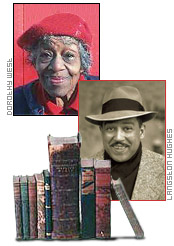Black Books

Required reading in African-American literature
by Ricco Villanueva Siasoco |
 Many of the earliest published Black writers were slaves and abolitionists. Phillis Wheatley spoke no English but by the time she was sixteen, under the tutelage of her owners, had mastered the language. Related Links
|
Who said the classics were all written by dead white males? In the last two hundred years, Black writers have contributed some of the most spirited and important works to American literature. These range from early narratives depicting slavery to modern works dealing with the lingering effects of slavery, racism and apartheid. In fact, some of the most risky work these days is being written not only by African Americans, but Americans of Dominican, Jamaican, and Haitian descent. Not to mention Black writers in Africa and Europe.
The First African American Writer
Many of the earliest published Black writers were slaves and abolitionists. First to make a name was Phillis Wheatley, a slave brought from Africa as a child and sold to a Boston merchant. Wheatley spoke no English but by the time she was sixteen, under the tutelage of her owners, had mastered the language. Her interest in literature led her to write and publish Poems on Various Subjects in 1773.
Wheatley's work was controversial because its author was a bonded slave; perhaps the next major work written by a slave was Narrative of the Life of Frederick Douglass, which was published in 1845, after Frederick Douglass escaped slavery for the second time.
Turn of the Century Intellectuals
With literacy and educational opportunities increasing for Black people, the audience for Black writers had grown by the turn of the century. Among the most notable writers was W.E.B. Du Bois, one of the original founders of the NAACP, who published a collection of essays titled The Souls of Black Folk.
Booker T. Washington, an educator and founder of the Tuskegee Institute, published among other works, Up From Slavery (1901), The Future of the American Negro (1899), Tuskegee and Its People (1905), and My Larger Education (1911). The leading two Black intellectuals, Du Bois and Washington actually had opposing views on how Black people could better themselves in society.
Harlem Renaissance
About the author







